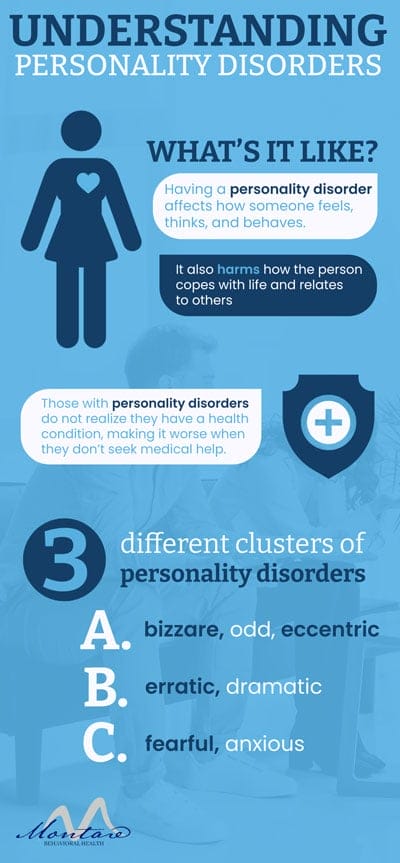Understanding The Types of Personality Disorders
Having one of the types of personality disorders affects how one feels, thinks, and behaves around others or their environment. It makes it challenging for one to relate well with themselves or others, and harms how the affected individual copes with life.
Those with personality disorders may not realize they have a mental health condition, making it worse because they don’t seek medical help. They often find themselves distressed and are unable to form meaningful relationships at work, in institutions, and others despite social settings.
Below are ten types of personality disorders categorized according to their respective groups as listed by DSM-5:
Cluster A Personality Disorders (Bizarre, odd, eccentric)
- Schizoid Personality disorder
- Paranoid personality disorder
- Schizotypal personality disorder
Schizoid Personality Disorder
Schizoid personality disorder is a cluster A personality disorder meaning affected individuals have odd and eccentric behavior. The name “schizoid” describes the natural drive to focus on oneself while disconnecting from the external world.
The cause of this cluster A’ personality disorder is not known, though a combination of environmental and genetic factors, especially in early childhood, might play an instrumental role in the establishment of the disorder. Some other factors escalate one’s risk of developing the disorder like:
- Being born to a parent or having a relative who has either Schizoid’s personality disorder, Schizophrenia, or Schizotypal personality disorder
- Being born to a parent who was neglectful or emotionally cold
A person affected by Schizoid personality disorder is often detached, emotionally cold, reserved, and susceptible to fantasy and introspection. A person with this disorder usually has no appeal for sexual or social relationships, lacks emotional reaction, is uninterested in others, and has social conventions and norms. Besides, they may seem to lack goals and motivation.
 How Schizoid Personality Dramatically Affects Relationships
How Schizoid Personality Dramatically Affects Relationships
One hypothesis about Schizoid’s personality disorder states that the subjects’ are susceptible to a tremendous inner personality. They feel a strong desire for intimacy, but they find it very stressful or difficult to start or keep close relationships, making them withdraw into their world.
People affected by this condition rarely seek medical attention, as they generally function very well and remain undisturbed by their oddness, despite their hesitancy to create close relationships.
Schizoid’s personality disorder commonly occurs in men than it appears in women. It occurs widely in people having close relatives affected by Schizophrenia. Even so, Schizoid personality disorder requires personality disorder therapy for the affected individual to learn how to cope with it.
Paranoid Personality Disorder
A paranoid personality disorder, which is also a cluster A personality disorder, is described as a prevalent distrust of people, including friends, family, or even one’s partner. It makes the affected individual suspicious, guarded, and the subject is always looking out for clues to justify his or her fears. The affected individuals:
- Feel a powerful sense of their rights, and are delicate when faced with defeat or setbacks
- Refrain from sharing personal information because they are afraid the information may be used against them
- Hold on to grudges and are sensitive to humiliation and shame
- They also tend to project their fears and failures on others and are continually looking for a scapegoat to accredit their feelings and thoughts
- Read into casual remarks or looks from other people
- Do not relax quickly
- Have issues with temper, especially when their character or actions are questioned or attacked
- Tend to be hostile, argumentative, and stubborn
This disorder’s causes are unknown, but it is believed to be an amalgam of both psychological and biological factors. Besides, issues during childhood, such as childhood trauma, are also thought to contribute to paranoid PD.
Studies show that paranoid personality disorder is inheritable and is accompanied by schizoid personality disorder or schizotypal personality disorder. Paranoid PD tends to affect men more than it does affect women and commonly begins during early adulthood.
Schizotypal Personality Disorder
A schizotypal personality disorder is depicted by strangeness in behavior, appearance, perception, and speech and is similar to Schizophrenia. Subjects are eccentric, seem odd, and have unusual thought patterns. These individuals:
- Tend to believe in strange things, magic is suspicious and, have obsessive ruminations
- They are often afraid of social interaction and perceive other people as harmful
- They are constant loners and lack connections beyond the immediate family
- Have inapt emotional responses and sometimes show no emotions at all
- Experience social anxiety
- Dress weirdly, often wearing peculiar clothes or stay unkempt
Schizotypal personality disorder manifests itself during early childhood and is often a lifetime disorder. The exact cause of schizotypal personality disorder is unknown but it’s common in people who have a relative diagnosed with Schizophrenia.
Schizotypal PD is more typical in men than it is in women. It requires one to get personality disorder therapy or personality disorder counseling available in personality disorder treatment centers.

Cluster B Personality Disorders (Erratic, dramatic)
- Borderline personality disorder
- Antisocial personality disorder
- Narcissistic personality disorder
- Histrionic Personality disorder
Borderline Personality Disorder
A borderline personality disorder is depicted when an individual emphatically displays unstable emotions, mood swings. Subjects feel empty and are afraid of being abandoned. These individuals often have intense yet dangerous relationships, illustrated by anger issues, and emotional instability. The disorder affects ones’ thinking and perception of one-self, making it difficult to control emotions.
A borderline personality disorder is often characterized by:
- Risky and impulsive behavior is often depicted in gambling practices, engaging in unsafe sex, and binge eating
- Has a fragile self-image
- Has constant mood swings
- Experiences suicidal thoughts and behavior, and often threatens to self-injure
- Is afraid of abandonment or being alone
- Individuals consistently feel void and empty
- Subjects’ may have sudden outbursts of anger
- One has phases of stress-related paranoia
It is believed that borderline personality disorder results from sexual abuse during childhood, and is common in women than in men because women are susceptible to sexual abuse. The only way to get diagnosed is by visiting a personality disorder center.
One can then receive personality disorder counseling and personality disorder therapy to help them manage the disorder. These services are available to help treat the various types of personality disorders.
Antisocial Personality Disorder
An antisocial personality disorder is characterized by an individual’s regard for the laws, rules, and obligations. Such subjects’ may show signs of aggressiveness, lack of guilt, irritability and may not learn from their mistakes.
These individuals do not have trouble forming relationships and appear charming, hence the name ‘charming psychopath.’ However, their relationships are short and fiery. An antisocial personality disorder is often associated with criminal behavior, and the affected individuals are often jailbirds.
Below are the characteristics of people with antisocial personality disorder:
- They do not have regard for other people’s feelings or needs
- They are pathological liars, thieves, and con artists. They often use aliases instead of their real name and are charming, usually aiming to manipulate others
- They have consistent trouble with the law
- They are deviant and repeatedly violate other people’s rights
- They have disregard for their safety or other people’s safety
- Engage in impulsive behavior
- They lack empathy and remorse
- They are continuously irresponsible
- They have short-lived and abusive relationships
- They are hostile, highly irritable and aggressive
The causes of antisocial PD are unknown, but it is thought that genes contribute to this disorder. An antisocial personality disorder is common in men and can be diagnosed from the age of 15.
The affected individuals often begin by displaying disregard for the law and often destroy property. The disorder can be diagnosed and treated using personality disorder counseling in personality disorder treatment centers.
Narcissistic Personality Disorder
A narcissistic personality disorder is a health condition distinguished by individuals feeling self-important, entitled to things, and a constant need to be seen or admired. The term narcissist is derived from a Greek myth, which pertains to an individual, Narcissus, who fell in love with his reflection. The narcissistic personality disorder is one of the more well known types of personality disorders. Let’s look at the characteristics of those with narcissistic personality disorder:
- Subjects’ belief that they are unique and more meaningful than other people
- They often fantasize about power, attractiveness, and success
- Have disregard for other people’s feelings and needs
- Always expect praise and admiration
- They exaggerate their skills, talent, and achievements
- They are often arrogant
- They usually take advantage of others and set unreasonable expectations, especially when they offer something
- They are envious of others and believe others envy them
- They seek to win regardless of who they hurt
- These individuals tend to hurt others and are unapologetic
- They also hurt easily, but do not show emotions when hurt
- They do not take responsibility for their mistakes and often blame others
- They distinguish themselves as natural leaders and disregard other people’s opinions
However, studies show that most people are attracted to narcissistic individuals and find their confidence charming. This disorder’s exact cause is unknown, but it is thought to be learned, especially from how one handles stress. It is common in children whose parents shower them with praise, which creates an inflated ego. It can also occur in abandoned children, who feel they have to look out for themselves—creating a self-center survivalist instinct. A narcissistic personality disorder is common in men and can be diagnosed at an early age, around eight years.
Histrionic Personality Disorder
Those with histrionic personality disorder are characterized by a lack of self-worth and depend on other people’s approval and attention for their happiness.
Let’s look at the characteristics of people with a histrionic personality disorder:
- Always seek consent and attention to feel good about themselves
- Are easily swayed by others
- Have shallow and quick-changing emotions
- Speculate that their relationships with other people are deeper than what they are
- Are emotional, dramatic, and sexually provocative, all aimed at getting noticed
- Converse dramatically using strong opinions, yet lack facts to back their views
- Are impulsive and act spontaneously
- React poorly to rejection, and become histrionic
- Threaten suicide or self-harm to get attention
- They are generally self-centered and often do not care about others
Histrionic personality disorder is common in women, and its cause is currently unknown. However, it is believed that the condition is learned or inherited from parents. The condition can be treated through personality disorder counseling.

Cluster C Personality Disorder (Fearful, anxious)
- Dependent personality disorder
Dependent Personality Disorder
For dependent personality disorder, the individuals do not have self-confidence, and frequently require other people to look out for them. They demand a lot of assistance to function or make decisions. Below are the characteristics of dependent personality disorder:
- They depend on others and require others to take care of them
- They tend to be clingy and submissive to others
- They lack self-confidence and rely on reassurance or advice from others to make insignificant decisions
- They are afraid of responsibility
- They fear disapproval or arguments
- They tolerate ill-treatment, even when they have options
- They jump into relationships quickly
A dependent personality disorder is thought to be caused by developmental or biological factors and is common in children raised under strict parenthood. It occurs uniformly among females and males, and the first signs are seen in early-middle adulthood.
Types of Treatment for Personality Disorders
Personality disorder treatment options that are best for one mainly depend on one’s particular disorder. For one to get help, they need to identify that they have a disorder. Next, they should check into a personality disorder treatment center where they can receive personality disorder counseling and personality disorder therapy.
Severe cases of personality disorders require inpatient treatment, especially when there’s a risk of harming oneself. Once an individual is declared stable, outpatient programs may then be used to treat one’s personality disorders.

Medications
The common forms of medicine used to treat personality disorders include antidepressants, mood stabilizers, antipsychotic medications, and anti-anxiety medications.
Begin Treatment for the Types of Personality Disorders in Los Angeles, California
At Montare Behavioral Health have highly-qualified professionals. We offer personality disorder counseling and personality disorder therapy at our treatment centers throughout California. Contact us to receive the best personality disorder treatment available at our personality disorder treatment center in Los Angeles, CA.



















 How Schizoid Personality Dramatically Affects Relationships
How Schizoid Personality Dramatically Affects Relationships


